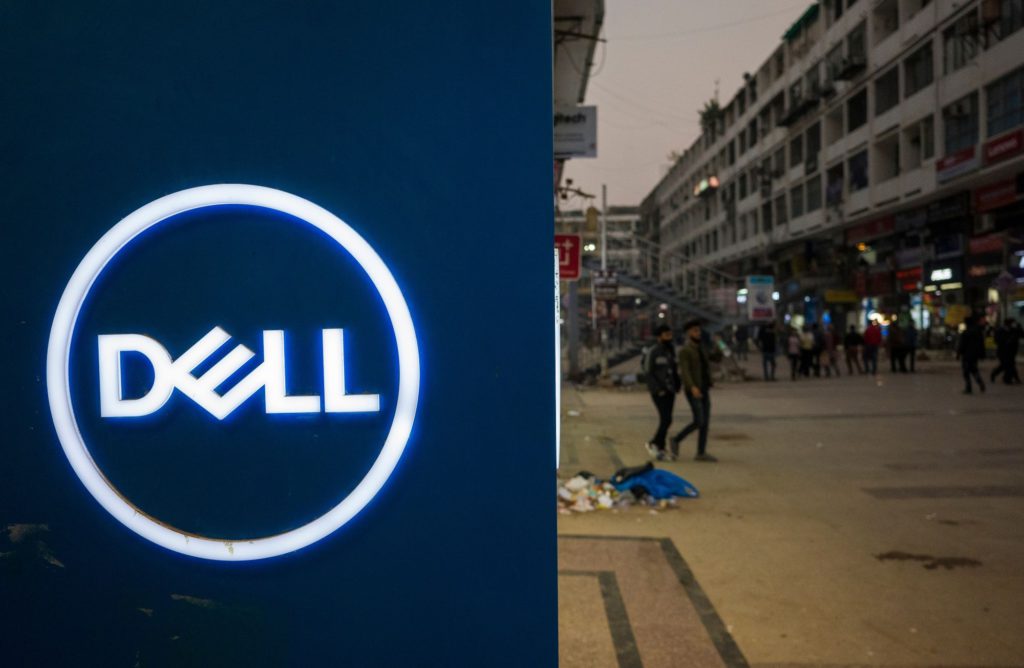As investors fled high-flying tech stocks this year, they turned to old-school companies such as computer maker Dell Technologies Inc., offering growth at a much cheaper price. Now that trade is running out of steam.
(Bloomberg) — As investors fled high-flying tech stocks this year, they turned to old-school companies such as computer maker Dell Technologies Inc., offering growth at a much cheaper price. Now that trade is running out of steam.
Dell has slumped 10.2% the past month, worse than the tech-heavy Nasdaq 100 Index. The market is pricing in the growing reality that corporations are pulling back on hardware purchases given that a recession may be looming. The thesis got support Thursday from Dell Co-Chief Operating Officer Jeff Clarke, who said the company is “in an increasingly challenging environment.”
At 6 times estimated earnings for the next year, shares of Dell are still cheap — every component of the Nasdaq 100 is more expensive — yet analysts are now busily trimming those estimates. Federal Reserve Chair Jerome Powell added to the gloom Friday when he said the central bank will keep raising interest rates to cool inflation, which will bring “some pain” to households and businesses.
The weakness has spread to other hardware companies as well. HP Inc. and Hewlett Packard Enterprise Co., both of which report results after the market close on Tuesday, plunged on Friday and have underperformed tech over the past month, though by smaller margins than Dell.
Shares of Dell rose 0.3% on Tuesday. HP fell 0.2% and HP Enterprise rose 0.3%.
“With every central bank trying to tighten monetary policy, and against very tough year-over-year comparisons, the setups for the stocks aren’t attractive,” said Ted Mortonson, a technology strategist at Robert W. Baird & Co. “They may screen as cheap, but based on the macro they look like value traps.”
The slowdown in business is all the more notable because the industry has just come through a period of robust demand related to the pandemic. Analysts predict that revenue will decline in each of the next two quarters, versus 17% growth in the last fiscal year.
In addition, the group’s heavy overseas exposure — Dell, HP and HP Enterprise all got more than half their 2021 revenue from outside the US, according to data compiled by Bloomberg — puts them at a disadvantage. The US dollar index is hovering near the highest since 2002, meaning those international sales buy many fewer dollars when they’re brought back home.
The case for some of these stocks earlier this year was simple: They were profitable, paid dividends, were cheaper than broad tech indexes and offered a modicum of growth. To be sure, that argument is still working for another old-school tech company: International Business Machines Corp. is still outperforming broad tech indexes in the past month.
Wayne Kaufman, chief market analyst at Phoenix Financial, said a discounted price isn’t enough to make hardware stocks attractive at the moment.
“There’s no sign that fundamentals have bottomed, as hardware companies continue to work through inventory and demand issues, which suggests that investors should avoid them for the time being,” he said.
Tech Chart of the Day
Shares of semiconductor companies have been struggling of late, with the primary industry benchmark index closing at its lowest level in more than a month on Monday. The Philadelphia Stock Exchange Semiconductor Index is coming off a 7.6% drop over the past two trading days, making for its biggest two-day decline since June 13. Over the past month, the chipmaker index is down about 6.2%, compared with a 1.2% decline in the Nasdaq 100 Index. Last week, Nvidia gave an outlook that was seen as weak, adding to concerns about a slump in the bellwether industry.
Top Tech Stories
- Elon Musk has cited the recent accusations from a Twitter Inc. whistle-blower as a new reason to terminate the $44 billion takeover of the social media platform.
- Lawyers for both Elon Musk and Twitter subpoenaed the whistle-blower who says the social-media platform’s officials didn’t know or care to find out how many accounts were spam or robot accounts as the billionaire seeks to cancel the buyout.
- Microsoft Corp. outlined planned changes to the terms of its software licensing agreements, following complaints to antitrust regulators from some European cloud-computing service providers that the company’s practices put rivals at a competitive disadvantage.
- An endemic shortage of chips costing anywhere from 50 cents to $10 is slowing down swathes of the $600 billion semiconductor industry, Taiwan Semiconductor Manufacturing Co.’s top executive warned Tuesday.
- Y Combinator, the technology industry’s most prestigious business incubator, appointed venture capitalist Garry Tan as its new head.
- Kyocera Corp. founder Kazuo Inamori — a former Buddhist priest who went on to influence Japanese entrepreneurs for decades — has died. He was 90.
- Pakistani startup PostEx, a provider of courier and financing services to online merchants, acquired logistics company Call Courier in a deal that makes it the nation’s largest e-commerce delivery firm, according to its founder.
(Updates to market open.)
More stories like this are available on bloomberg.com
©2022 Bloomberg L.P.











